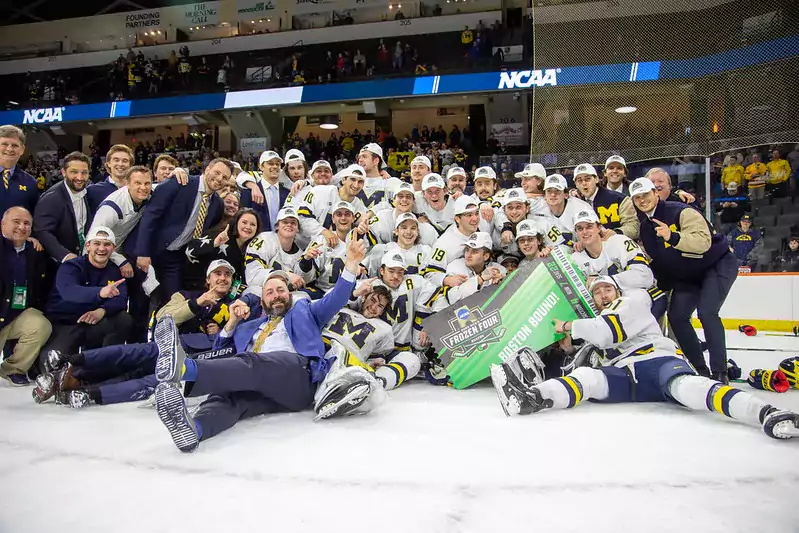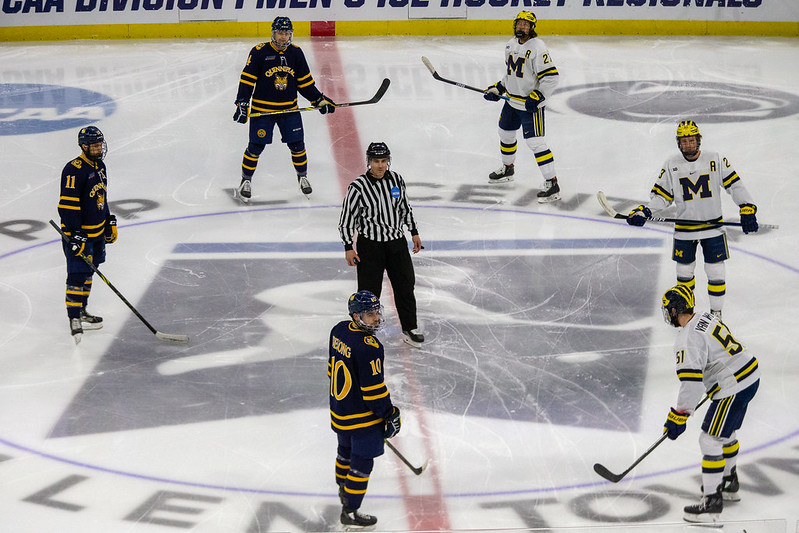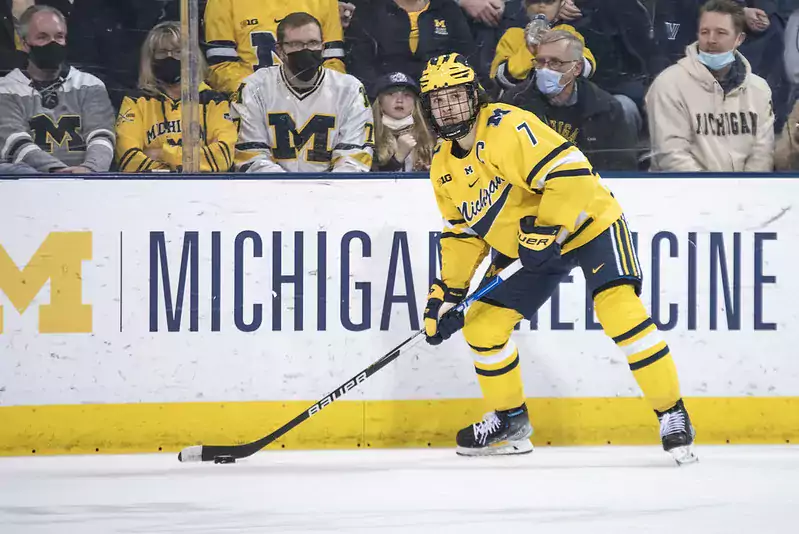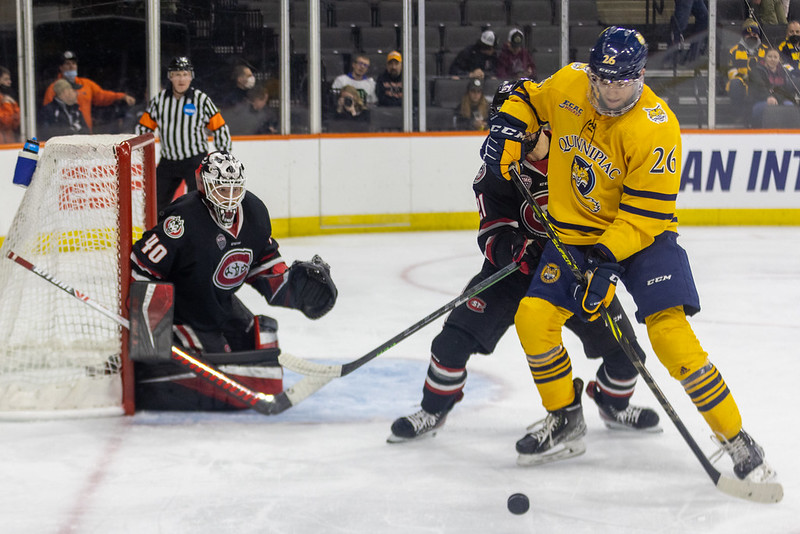quinnipiac

3/25/2022 – Michigan 5, American International 3 – 30-9-1
3/27/2022 – Michigan 7, Quinnipiac 4 – 31-9-1, Frozen Four
The NCAA Hockey Tournament is one of the more absurd exercises on earth, distilling a sport that is highly random and variable on a game-to-game level into exactly that: a series of single games where everything is on the line. In terms of setting out to crown the "best" team, it falls far short of that aim, generally recognizing champions who were more lucky than good, although every team in the tournament is good. It's just that each game often hinges on a whim, a lightning bolt moment of chance decided by the margin of a few inches. We saw that twice this weekend in games Michigan was not involved in. Western Michigan defeated Northeastern after the puck crossed the goal line by the tiniest of margins before being swatted out by goaltender Devon Levi:
Devon Levi turns the puck over behind the Northeastern goal, and Luke Grainger makes him pay with the overtime winning goal.@WMUHockey advances to the regional final. pic.twitter.com/YgJLJsxdTV
— J.D. Burke (@JDylanBurke) March 25, 2022
Denver and Duluth were playing an incredibly intense game on Saturday that was decided by a bounce for the ages off the end boards, slingshotting back off Duluth's goalie Ryan Fanti, and laying free for the taking of Carter Savoie in the crease:
Goal No 22 for Carter Savoie & the Pios are up. pic.twitter.com/6X1iP11Ioe
— Denver Hockey (@DU_Hockey) March 26, 2022
Just like that, #5 Minnesota-Duluth had their terrific season ended because of an unlucky bounce.
The NHL has set up their playoff structure so that the teams play four rounds of best four-out-of-seven series to determine a champion. It is not perfect, and sometimes randomness still reigns supreme, but that structure is designed to weed out as much of the inherent randomness to hockey as possible. The NCAA Tournament does the exact opposite, reducing games to dice rolls, where one mistake or one bad bounce can end a season and render the preceding forty games of work meaningless. To win the NCAA Tournament is the equivalent of an NHL team winning the first game of each of the four series they play in the playoffs, something that hasn't happened since 2013.
Michigan has felt the cruel knife of the NCAA Tournament before. A catastrophic collapse against Colorado College in 2005 ended the season of a 30-7-3 Michigan team that had dominated the CCHA in the regular season. A stunning shutout at the hands of Air Force in the first round eliminated a one seed Michigan team back in 2009. A controversial no-goal call in OT against Miami (OH) in 2010 cost Michigan a chance to play in the Frozen Four in Detroit. And a loss to Cornell in OT of the first round as the second overall seed ended Michigan's 2012 season and the career of Shawn Hunwick.

[David Wilcomes]
The Wolverines rode into this tournament as the top overall seed with their dream team roster and the best chance to end the national title drought in fourteen years. I picked Michigan to advance out of the regional, as did David, and all of College Hockey News' experts. They had a favorable draw and were playing good hockey. But in the back of your head you knew there was a chance that disaster could strike. This is the NCAA Tournament, it's happened before, it could happen again.
It didn't happen this weekend, but it felt like it could. Michigan fans got visions of 2005 amid a disastrous third period that saw Quinnipiac score three times in ten minutes to trim the seemingly insurmountable lead to one goal. Everything this team had worked for over the course of 40 games dangled in the balance, as Michigan clung to a rope for dear life, feeling angry Bobcats nipping at their toes. The dark clouds converged... and then they abated. A lifeline emerged from the Quinnipiac coaching staff and Michigan climbed that rope to safety as Michael Pastujov hit the empty net from just outside the faceoff circle.
It was not pretty, but it doesn't have to be. In this insane tournament that haunts college hockey fanbases each March, you get no style points for winning in a non-heart attack-inducing manner. You do whatever it takes to move on to the next round, because your season is on the line every game, and in every second of every game. In an event where a bad bounce can ruin your season, you never, ever take NCAA Tournament wins for granted.
[AFTER THE JUMP: More narrative & HockeyBullets]

ESSENTIALS
| WHAT | #1 Michigan vs #2 Quinnipiac |
|
|---|---|---|
| WHERE | PPL Center Allentown, PA |
|
| WHEN | 6:30 PM EST | |
| KRACH Prob. | Michigan (71.0%) | |
| TELEVISION | ESPN2 |
OVERVIEW
Here we are, gang: one win from the Frozen Four. Michigan meets Quinnipiac tonight in the Elite Eight in Allentown, PA, for the right to face Denver in Boston. Win or go home, the biggest game of the season... no pressure or anything!
THE US
Michigan cruised through its opening round game against American International by a score of 5-3 on Friday afternoon. They scored two goals very early on, then tacked on two more in the early second period to go up 4-1. From then on it was basically cruise control, as Michigan was vastly better and dictated play. There was some sloppiness at times, but I would chalk that up to getting bored more than anything else. It's the only tournament game where Michigan will be considerably better than their opponent and there's not much you can take from that sort of dynamic and try to extrapolate to a game like today's.
Michigan got contributions from across the lineup, but their top line of Matty Beniers, Kent Johnson, and Brendan Brisson was particularly effective, combining for two goals (one on the PP) and assisting on Ethan Edwards' tally. The other two goals came from the third and fourth lines. It was a pretty boring game and that's all you can ask for in the first round against the worst team in the field.
THE THEM

[David Wilcomes]
Quinnipiac is the last team from any of the NCAA's three eastern conferences left in the tournament. The 8th seeded team overall and the 2 seed in the Midwest Regional, QPac steamrolled through the regular season in the ECAC, which is, as Brian called it on the podcast, the A-10 of college hockey. Not quite a power conference, but also regularly producing at least one good-ish team. Quinnipiac has been that team for the last number of years, making the tourney in 2013, 14, 15, 16, 19, 21, and now 22. That run of success includes Frozen Four appearances in 2013 and 2016, both of which ended with them losing in the national championship game.
What's tough about assessing a good team from the ECAC is that 1.) it is generally a poor league, with many very bad teams at the bottom that weigh down strength of schedule and 2.) those very bad teams (and even some of the mediocre ones) have the same offensive firepower as a toddler wielding a foam sword. The ECAC is notorious for its extremely low event hockey games, and for producing champions who boast mind-boggling defensive statistics on paper. Quinnipiac is one of those champions. The Bobcats are the NCAA's #1 defense, allowing just 1.1 goals against per game this season. They are also #2 with a .941 SV%. Figuring out how much of that is real and how much of that is beating up on bad teams is the big question.
What we know is that this QPac squad is simply exceptional defensively when it plays in its conference. In the first 16 conference games they played this season, they allowed 0, 0, 2, 0, 0, 0, 0, 1, 0, 1, 2, 0, 1, 0, 1, and 1 goals. Yowza. It wasn't until mid-February that they finally allowed 3 in a conference game! That is genuinely dominant stuff, but again, we have to look at strength of schedule. The ECAC is a very bad league, especially this season, and it also doesn't help that QPac didn't beef up their non-con either. Here's a list of Quinnipiac's results this season based on whether opponents rank in the top 20, 21-40, or 41-60 of KRACH:
- KRACH Top 20: 4-3-2
- KRACH 21-40: 6-1-4
- KRACH 41-60: 20-0-1
They play most of their games among the bottom feeders who linger in the bottom twenty and they win at an astounding clip in those games. Against everyone else, it's not as impressive and they go to overtime often (hello, low event hockey). Their other metrics, while still solid, are not nearly as impressive against teams in the top 20 in KRACH, and the save percentage of goalie Yaniv Perets drops considerably from its gargantuan average.
[AFTER THE JUMP: More Preview]

26